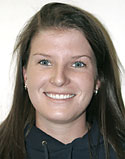 |
|
Lindsey Frazier
staff writer
|
|
|
By Lindsey Frazier
Arizona Daily Wildcat
Thursday, December 1, 2005
Print this
The Arizona volleyball team enters NCAA Tournament play this weekend with a program-best No. 4 seed, a five-match winning streak and a 14-4 conference record - including a season sweep of perennial power Stanford.
There's no reason the Wildcats should have been denied a chance to host the first and second rounds of the tournament in McKale Center, right?
Apparently ASU - and NAU, for that matter - didn't get the memo, leaving the Wildcats relegated to 19 degrees Fahrenheit of fun in snow-covered Salt Lake City.
"I think the biggest reason is because there are teams within that area that can drive to the host school," said Arizona head coach Dave Rubio, noting Utah State's ability to make the 90-mile drive to the Utah campus. "I think the NCAA is mandated, I guess, to try to restrict as much air travel as they can."
Arizona doesn't have that luxury of proximity. The Sun Devils finished 8-20 overall and 3-10 in Pacific 10 Conference play, the Lumberjacks 4-19 and 3-11 in the Big Sky Conference. Neither, obviously, is in the tournament field.
A scheduling conflict in McKale Center also didn't help Arizona's cause.
Because the Arizona women's basketball team's Fiesta Bowl Classic Tournament will be held Saturday and Sunday in McKale Center, Rubio was forced to put in a Thursday-Friday bid to the NCAA.
Still, he said, that was not the real reason why the Wildcats were denied the chance to host.
"I think it's more along the lines of the fact they want one team with the ability to drive in," he said.
So, despite doing their part and earning the chance to stay home, the Wildcats hit the road, essentially punished because ASU and NAU failed to make the tournament.
But having to travel isn't the only issue the Wildcats face going into Utah.
The first and second rounds will be held on Utah's Crimson Court, which, according to its athletic department's Web site, holds 1,500 fans, although 1,000 is probably a more realistic estimate.
Rubio compared the facility to a mediocre high school gym.
"It's being played in the basement of a physical education department," he said. "For a postseason match, it should be held in an arena and not in a high school gym.
"Would we host an event like this in Bear Down (Gym)? No, we wouldn't," he added. "It's not suitable and neither is this venue."
The disparity only worsens, as top-seed Nebraska, No. 2 seed Penn State and No. 5 seed Stanford are hosting both the first and second rounds in addition to next weekend's regional round.
None of those teams will hit the road until they reach the Final Four, while Washington, a No. 3 seed and champion of arguably the toughest conference in the country, shares the same fate as the Wildcats. The Huskies will be on the road for the entire tournament.
The Cornhuskers and the Nittany Lions made strong cases to host with commanding 28-1 and 29-2 overall records, respectively.
 |
|
So instead of pitting the nation's best teams against each other later in the tournament, it appears the NCAA would rather have a geographically balance Final Four instead.
|
 |
But Pac-10 foe Stanford is a different story.
The Cardinal (25-5) and the Wildcats (22-5) ended the regular season tied for second place in the conference standings. Yet Arizona brought down Stanford twice this season, and it can be safely assumed that those two wins helped the Wildcats move past the Cardinal for the No. 4 seed.
With the two teams playing in the same bracket, it is likely that Arizona and Stanford will meet in Palo Alto, Calif., for a rematch in regional action on Stanford's home court in Maples Pavilion.
And while six Pac-10 teams made the tournament, the State College regional at Penn State is without one.
By contrast, there are three Pac-10 teams - Arizona, Stanford and Southern California - in the Palo Alto regional.
According to Rubio, the NCAA no doubt loaded up certain regionals with Pac-10 teams to prevent having three Pac-10 teams in the Final Four, which was the case last season.
Stanford and USC have combined for the last four NCAA championships, with the Cardinal winning in 2001 and again last season. The Women of Troy won back-to-back titles in 2002 and 2003.
So instead of pitting the nation's best teams against each other later in the tournament, it appears the NCAA would rather have a geographically balanced Final Four instead.
"It never has been a fair championship. It's never going to be a fair championship. They don't want what happened last year," Rubio said. "When you take a look at our bracket, we've got Stanford, USC and ourselves all in the same bracket, and there's only going to be one team out of that bracket. All three of us could go to the Final Four, and they don't want that to happen."
